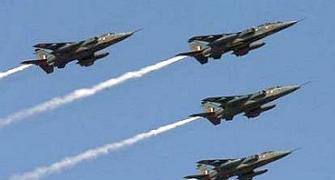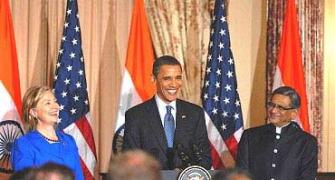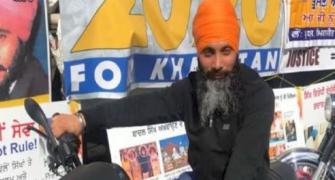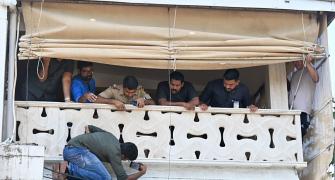Blake, who was the first speaker on a session on India at the conference titled 'Worldviews of Rising Powers: Domestic Foreign Policy Debates' organised by the Sigur Center for Asian Studies of George Washington University, said, "Shifting domestic politics has a very significant impact in India as it does in the United States, vis-à-vis the shaping of each country's foreign policy."
"I would point to the example of the civil nuclear deal, where we never could have imagined that politics would lead the BJP to be in the opposition to stand so stubbornly against the nuclear deal when really they were the ones that first initiated it when they were in power," he said.
But, when they were in the opposition, Blake noted, the BJP had become vociferous in attempting to torpedo the deal. "It raises the question whether that was pure politics or if in fact represents a view toward hyper-nationalism," he added.
"Another point that we should probably consider is the role of regional parties and how they fit in, towards the shaping of India's foreign policy. They often have a very significant impact on the country's specific foreign policy. I would cite for example, the DMK and the AIDMK in Tamil Nadu. They've often had a very strong impact on India's policy with regard to Sri Lanka," Blake said.
According to him, regional parties that are part of the government's coalition also often have a significant role in India's foreign policy. "I would point to Rashtriya Janata Dal supremo Lalu Prasad Yadav and the very significant role he played in helping the passage of the civil nuclear deal, Can we classify these regional parties as elements of the Congress and the BJP or regional parties are fractured. And what determines the foreign policies of some of these regional parties," he asked.
As far as the US is concerned, Blake said, "How can the administrations then deal with them is something we very often grapple with in the state department."
"And then, another big important point is that states like Gujarat have become increasingly global in their outlook and outreach. How does that impact Delhi? Foreign policy? Again something that we follow as we begin to dig into sub-national governments and sub-national outreach," he said.
Blake also spoke of "the influence of the Indian Diaspora," and acknowledged that "it's a group that we in the government have really made an effort to reach out to and work as closely as possible with."
"Again, the Punjabis in New York, the Tamil community and many, many others have quite a significant impact on our foreign policy in South Asia," he said, and "on Indian foreign policy as well."
Rajesh Rajagopalan, professor, Centre for International Politics, Organidation and Disarmament at the Jawaharlal Nehru University's School of International Studies in New Delhi said that the US shouldn't have been surprised at the BJP's opposition to the nuclear deal, because that's what an opposition in India does -- oppose.
He argued, "Imagine if the situation was reversed. The BJP was in power and Congress was outside, the latter wouldn't have supported it. So, in a sense, the idea of an opposition party in India is that you oppose. So, whatever the policy was, it would have opposed it."
But Blake obviously wasn't placated by this contention, and said, "It makes you wonder what they actually stand for, if they go back and forth."
Deepa Ollapally, associate director of the Sigur Center and professor of international affairs at George Washington University's Elliot School of International Affairs commenting on Blake's take on the influence of the Indian Diaspora, said, "It's a little bit of a love-hate relationship in India because at one stage the government resented the NRIs. But also they need them and I think they kept them at a distance for a long time until Silicon Valley happened and then they thought the NRIs are useful."
"Also, as the Indian market opened," she said, the government began to further cultivate them "and now, they are going to town on wooing the Indian Diaspora and I think it's very important."








